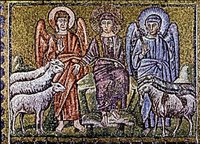The Judgment of the Sheep and the Goats
Q: During this morning’s quiet time, I encountered a question on Matthew 25:31-46, about the sheep and the goats. Jesus rewarded the “sheep” who, among other things, have given water, food, or shelter to “one of the least of these my brothers. (v. 40)” He sent the “goats” towards eternal punishment as they had not done anything good, even “to one of the least of these. (v. 45)” I am quite sure that salvation is through faith in God and His grace, so this passage could not be a warning to us about the “danger” of not giving to one of the least of the brothers. However, I could not fully comprehend this passage. Can you shed some light on its interpretation?
A: Before my response, please indulge a couple comments. First, “quiet time” is an excellent practice, yet something that many people have forgotten how to do. Regular Bible study, prayer, devotional reading, and meditation are vital parts of the Christian life.
Second, your question reminds me just how far “Ask the Pastor” reaches. Local readers of the small town newspaper, the Concordian, are joined by others like you, who read these columns on the internet. My home in Emma, Missouri and yours in Singapore are thousands of miles apart and vastly different in culture, yet we are joined by faith in Christ. It amazes and humbles me when I realize how widely these words travel and it encourages me to give my best to each answer.
 As for your question, you are correct. Salvation is God’s free gift. Truly good works are signs of the forgiveness and new life belonging to the believer. They are fruits of the Holy Spirit. Their absence indicates that all is not well in a person’s faith life. As James 2:14-17 says, “What good is it, my brothers, if someone says he has faith but does not have works? Can that faith save him? If a brother or sister is poorly clothed and lacking in daily food, and one of you says to them, ‘Go in peace, be warmed and filled,’ without giving them the things needed for the body, what good is that? So also faith by itself, if it does not have works, is dead.”
As for your question, you are correct. Salvation is God’s free gift. Truly good works are signs of the forgiveness and new life belonging to the believer. They are fruits of the Holy Spirit. Their absence indicates that all is not well in a person’s faith life. As James 2:14-17 says, “What good is it, my brothers, if someone says he has faith but does not have works? Can that faith save him? If a brother or sister is poorly clothed and lacking in daily food, and one of you says to them, ‘Go in peace, be warmed and filled,’ without giving them the things needed for the body, what good is that? So also faith by itself, if it does not have works, is dead.”St. Paul reminds us of both the free gift and the purpose of our salvation in Ephesians 2:8-10. First he tells us that we are saved “by grace” and that this is “through faith.” This new life is intended to be one of living in grace by doing good works, “For we are his workmanship, created in Christ Jesus for good works, which God prepared beforehand, that we should walk in them.”
After I published an early version of this reply (back in 2002), Pastor Bradley Drew of Metairie, Louisiana sent some comments on the passage from Saint Matthew. I share the following with his permission:
Dear Brother,
And might I add this about the Mt. 25 passage: It teaches salvation by grace. It is the goats who have their hand open, demanding payment: Lord, when were You sick and we didn’t care for you, in prison and didn't visit, hungry and a stranger, etc., and did not minister to you. The sheep are the ones who confess to only sins: “When ... when ... when?”
What you wrote is so very true and faithful. And thank you so much for it. I love receiving ATP! Just thought I had to point out that those who would use Mt. 25 to scold sinners into doing good works — or else! — are actually lining people up with the goats on the Last Day.
Scripture quoted from The Holy Bible, English Standard Version™, © 2001 by Crossway Bibles.
Send email to Ask the Pastor.
Walter Snyder is the pastor of Holy Cross Lutheran Church, Emma, Missouri and coauthor of the book What Do Lutherans Believe.
Technorati Tags: sheep and goats | Matthew 25 | good works | Judgment Day

2 Comments:
Excellent blog. I always learn from your answers. Thank you.
And thank you for taking the time to comment. I always enjoy finding out about readers, whether through their comments on the blog, their emails, or links back to Ask the Pastor from their own blogs and web pages.
Post a Comment
<< Home